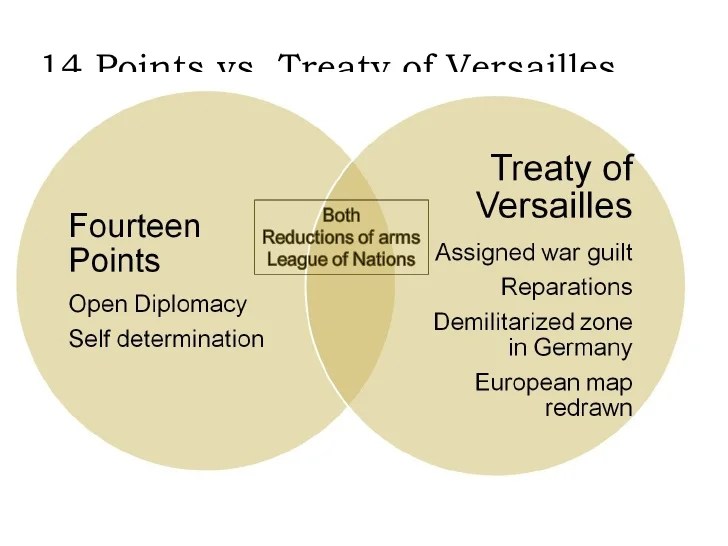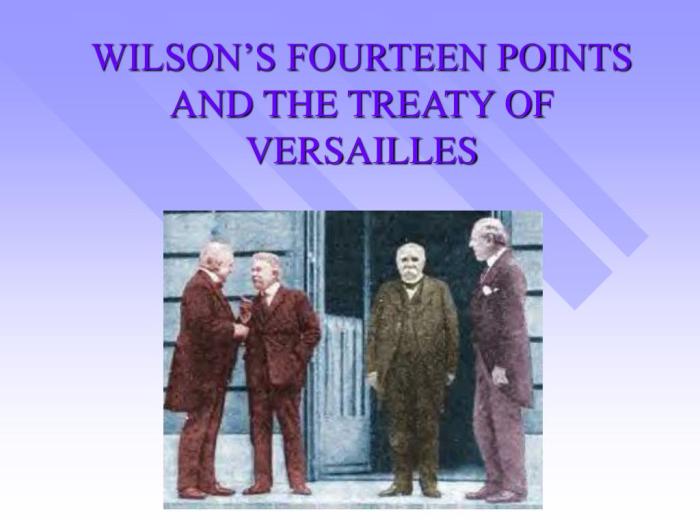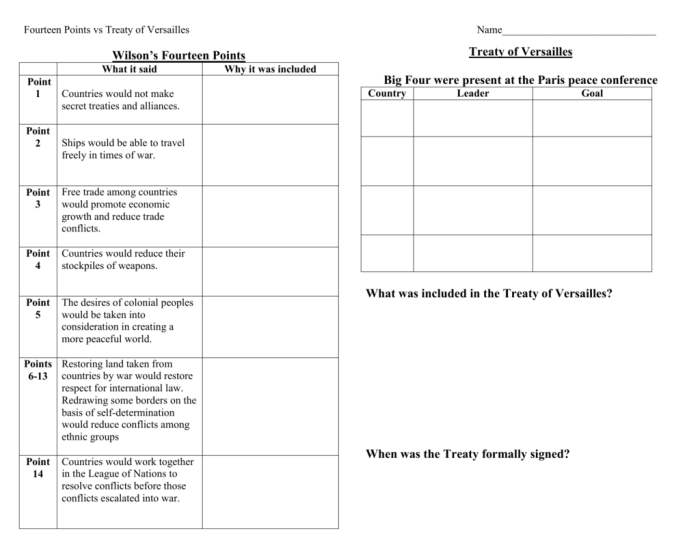Similarities between 14 points and treaty of versailles – The similarities between the 14 Points and the Treaty of Versailles are a testament to the enduring legacy of President Woodrow Wilson’s vision for a just and lasting peace after World War I. This essay will delve into the shared goals, principles, and specific provisions of these two historic documents, examining their impact and controversies.
The 14 Points, a set of principles Artikeld by Wilson in 1918, and the Treaty of Versailles, signed in 1919, both sought to establish a new world order based on the principles of self-determination, collective security, and the prevention of future wars.
Historical Context

World War I, a cataclysmic conflict that ravaged Europe from 1914 to 1918, had a profound impact on the development of the 14 Points and the Treaty of Versailles. The war’s unprecedented scale and devastation spurred a global yearning for a just and lasting peace.
President Woodrow Wilson of the United States emerged as a leading advocate for a post-war settlement that would prevent future conflicts. In January 1918, he presented his “Fourteen Points” to Congress, outlining his vision for a new world order based on the principles of self-determination, disarmament, and the establishment of international organizations.
Similarities in Objectives

The 14 Points and the Treaty of Versailles shared several common goals and principles. Both aimed to create a just and lasting peace by addressing the root causes of the war, such as imperialism, militarism, and secret alliances.
They emphasized the importance of self-determination, allowing nations to govern themselves without external interference. Both documents also called for disarmament, the reduction of military forces and weapons, to prevent future conflicts.
Specific Provisions
The 14 Points and the Treaty of Versailles contained specific provisions that addressed various aspects of the post-war settlement. The 14 Points proposed the creation of a League of Nations, an international organization to promote cooperation and resolve disputes peacefully.
The Treaty of Versailles implemented this proposal by establishing the League of Nations. It also included territorial adjustments, such as the transfer of Alsace-Lorraine from Germany to France and the creation of new states in Eastern Europe.
Impact and Legacy: Similarities Between 14 Points And Treaty Of Versailles

The 14 Points and the Treaty of Versailles had a significant impact on the post-World War I world order. The League of Nations, established as a result of the treaty, played a role in international relations and conflict resolution.
However, the treaty also faced criticism for its harsh treatment of Germany, which many historians believe contributed to the rise of Nazism and the outbreak of World War II.
Controversies and Criticisms

The 14 Points and the Treaty of Versailles have been the subject of numerous controversies and criticisms. Some argue that the 14 Points were idealistic and unrealistic, while others contend that the Treaty of Versailles was too harsh on Germany.
Critics have also pointed to the fact that the treaty failed to address the issue of colonialism, which contributed to ongoing tensions and conflicts in the post-war period.
Comparison Table
| Point | 14 Points | Treaty of Versailles |
|---|---|---|
| Self-Determination | Proposed allowing nations to govern themselves | Implemented through territorial adjustments |
| Disarmament | Called for the reduction of military forces and weapons | Imposed disarmament on Germany |
| League of Nations | Proposed the creation of an international organization | Established the League of Nations |
Questions and Answers
What were the main similarities between the 14 Points and the Treaty of Versailles?
Both documents emphasized the importance of self-determination, collective security, and the prevention of future wars.
How did the Treaty of Versailles differ from the 14 Points?
The treaty was more punitive than Wilson had envisioned, particularly in its treatment of Germany.
What were the long-term consequences of the Treaty of Versailles?
The treaty contributed to the rise of nationalism and resentment in Germany, which ultimately led to World War II.

